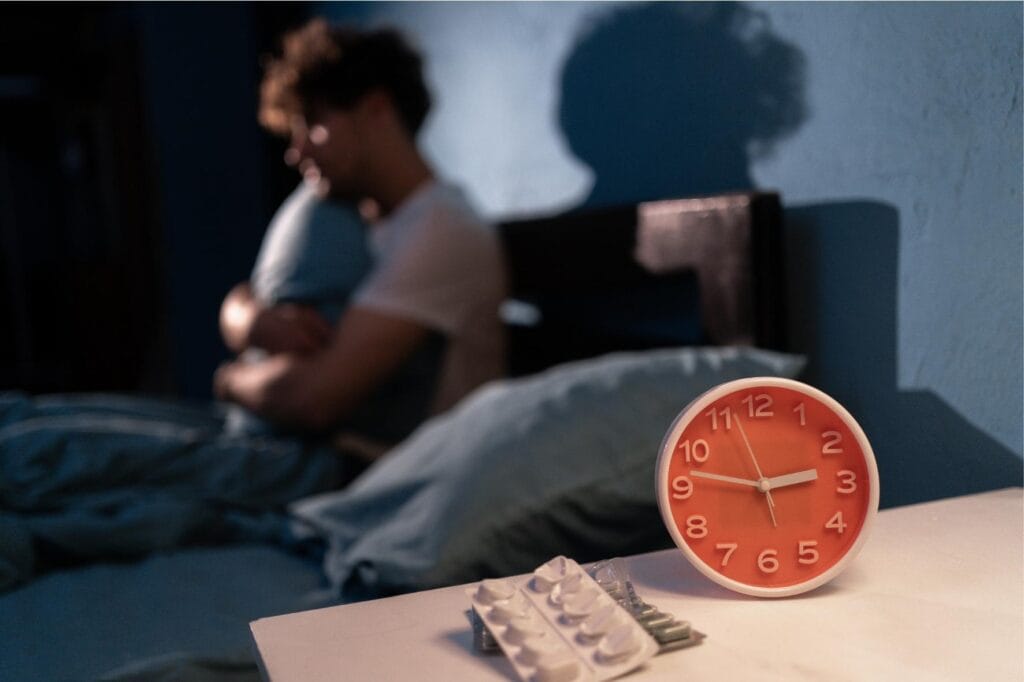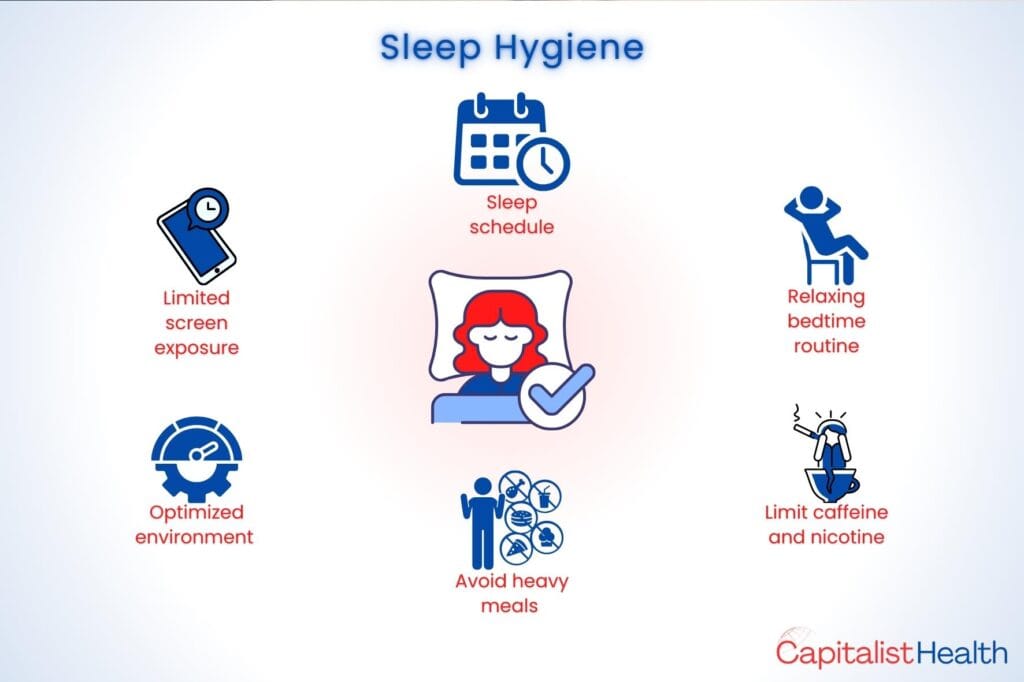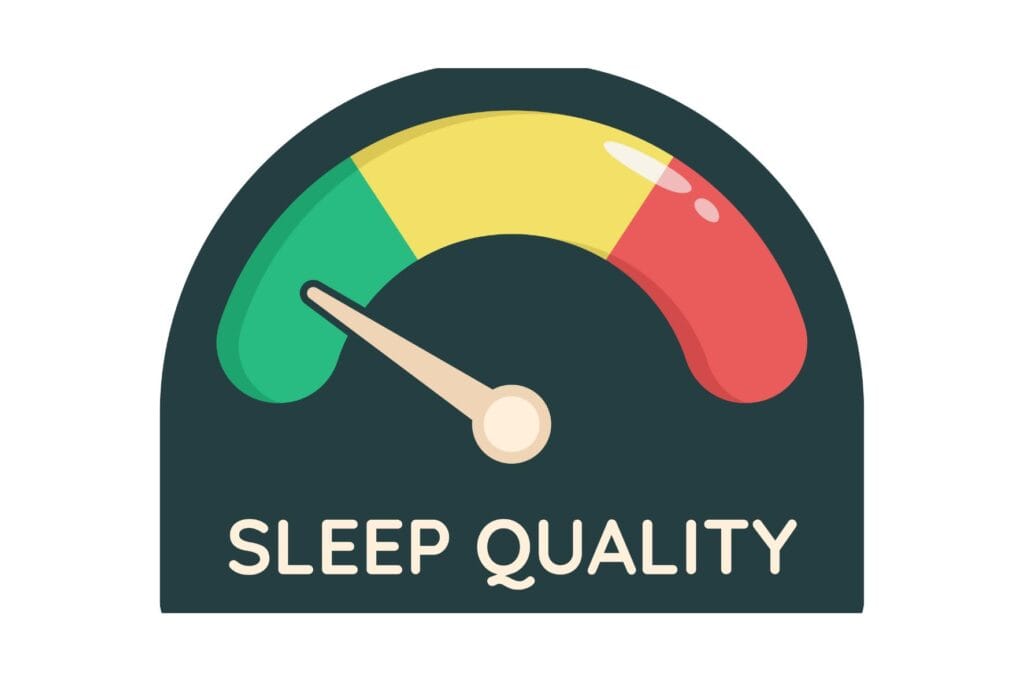Sleep is essential for overall well-being, affecting everything from mood and cognitive function to immune health and chronic disease prevention. Yet, many people struggle with poor sleep due to lifestyle habits, stress, and environmental factors.
Insufficient sleep and poor sleep hygiene increases the risk of heart disease, type 2 diabetes, obesity, high blood pressure, and other lifestyle-related preventable diseases. Beyond physical health, lack of sleep can lead to impaired memory, emotional instability, and decreased productivity. Fortunately, practicing good sleep hygiene can dramatically improve sleep quality and overall wellness.
Let’s explore the science behind sleep, its impact on health, and practical strategies to develop healthy sleep habits.
Why Sleep Matters?

Sleep is not just a passive state, it’s an active process that supports critical physiological and neurological functions. The recommended amount of sleep varies by age, but adults (18-60 years old) should aim for at least seven hours per night. Quality sleep is crucial for reducing the risk of serious health conditions and ensuring peak mental and physical performance. During sleep, the body:
- Repairs tissues and muscles.
- Strengthens the immune system.
- Consolidates memories and enhances cognitive function.
- Regulates hormones that influence appetite, metabolism, and stress response.
These processes are crucial for maintaining a healthy body, healthy cognitive function and emotional stability.
What Is Sleep Hygiene?

Sleep hygiene refers to the consistent habits that help to get quality sleep. Many people struggle with sleep issues due to factors such as stress, lifestyle choices, and unsuitable sleep environments. By adopting good sleep hygiene practices, individuals can significantly improve both the quantity and quality of their sleep.
Implementing effective sleep hygiene is an essential step toward fostering a consistent sleep routine that aligns with the body’s natural rhythms. This, in turn, can lead to improved physical health, enhanced mental well-being, and overall life satisfaction.
Consequences of Poor Sleep Hygiene

Disturbed sleep can lead to a variety of negative consequences, impacting both physical and mental health. Below mentioned are among the most significant outcomes of sleep disturbance:
☑️ Chronic Health Issues
- Poor sleep is linked to an increased risk of chronic conditions like heart disease, diabetes, obesity, high blood pressure, and stroke.
- These conditions can affect quality of life and may lead to premature mortality.
☑️ Cognitive Impairment
- Inadequate sleep can compromise attention, memory, and decision-making abilities.
- This cognitive decline affects productivity and daily performance.
- Sleep deprivation can lead to anger, frustration, irritability, and sadness.
- Chronic sleep issues can contribute to anxiety and depression, creating a vicious cycle of sleep disturbances and emotional distress.
- To combat fatigue, individuals may overconsume caffeine or rely on sleep aids, which can further compromise sleep quality.
To maintain a good sleep hygiene is crucial for overall wellness and to maintain good health. Prioritizing sleep and creating a restful environment can help mitigate these negative effects.
How to Improve Sleep Hygiene?

Developing sleep hygiene can transform your sleep quality. Follow these science-backed strategies:
✅ Maintain a Consistent Sleep Schedule
- Go to bed and wake up at the same time daily even on weekends.
- This helps to regulates your body’s circadian rhythm, which makes it easier to fall asleep and wake up feeling refreshed.
✅ Establish a Relaxing Bedtime Routine
- Engage in calming activities like reading, meditating, or stretching before bed, creating a pre-sleep ritual signals to your body that it’s time to relax and prepare for sleep.
- Avoid cognitive provoking activities like watching TV or mindlessly scrolling through your phone or social media.
✅ Optimise Your Sleep Environment
- Quality Bedding: A supportive mattress and pillows improve comfort.
- Keep the Room Cool: Maintain a temperature of 65-68°F to promote deeper sleep, a cooler environment promotes better sleep by enabling the body to cool down, which is essential for entering deeper stages of sleep.
- Block Noise & Light: Use blackout curtains, white noise machines, or earplugs to create a distraction-free environment.
✅ Reduce Screen Time Before Bed
- Avoid activities like watching TV or scrolling through your phone or gadgets at least one hour before bedtime.
- Exposure to blue light from these devices interferes with melatonin production, which in turn makes it harder to fall asleep.
✅ Be Mindful of Food and Drink
- Avoid heavy or spicy meals before bed to prevent discomfort.
- Limit caffeine, alcohol, and nicotine, especially in the evening, as they can disrupt sleep patterns.
✅ Incorporate Regular Physical Activity
- Daily exercise can enhance sleep quality, but avoid intense workouts close to bedtime as this can lead to stimulating the nervous system, potentially disturbing sleep making you tired the following day.
✅ Manage Nap Timing
- Keep Your Nap Timings Short (20-30 minutes) and avoid napping late during the evening to prevent any form of interference with nighttime sleep.
✅ Keep a Sleep Journal
- Track your sleep habits, bedtime routines, and disturbances to identify patterns and improve sleep hygiene.
✅ Seek Professional Help if Needed
- If persistent sleep problems continue, consult a sleep specialist or healthcare provider to rule out conditions like insomnia or sleep apnea.
Relation Between Hormones, Sleep Hygiene and Weight Management

Sleep plays a critical role in regulating hormones that influence appetite and energy balance. Disrupted sleep can lead to imbalances in hormones such as cortisol, melatonin, insulin, leptin, and ghrelin.
For instance, poor sleep can decrease leptin (which signals satiety) and increase ghrelin (which stimulates hunger), potentially leading to weight gain. This hormonal imbalance is a significant factor in the obesity epidemic. Understanding the complex interplay between sleep and these hormones is vital for developing effective strategies for weight management and improving overall well-being. Key hormones affected by sleep include:
- Melatonin – Secreted by the pineal gland in response to darkness, melatonin is vital for maintaining the circadian rhythm and facilitating sleep.
- Cortisol – Produced by the adrenal glands, cortisol is essential for the wake-up cycle, rising in the morning to promote alertness and energy.
- Insulin – Secreted by the pancreas in response to glucose, insulin helps regulate blood sugar but can disrupt sleep by triggering the release of adrenaline and cortisol.
- Progesterone – This hormone, produced by the ovaries, acts as a natural sedative, promoting relaxation and enhancing sleep quality.
- Leptin – Produced by fat cells, leptin levels drop with inadequate sleep, leading to increased hunger and potential weight gain.
- Ghrelin – Secreted by the hypothalamus, ghrelin stimulates appetite and is linked to decreased REM sleep, further impacting sleep quality.
- Serotonin – Produced in the brain and gut, serotonin regulates sleep cycles; high levels promote wakefulness, while low levels can lead to sleeplessness/insomnia.
- Oxytocin – Known as the “love hormone,” oxytocin is released from the hypothalamus and helps promote sleep by inducing relaxation and reducing stress.
- Growth hormone – Produced by the pituitary gland, growth hormone is crucial for growth, muscle repair, and bone development, with its levels peaking during deep sleep.
Spread Awareness: Improve Sleep Hygiene For Better Health

Quality sleep is a pillar of health, essential for mental clarity, emotional stability, and disease prevention. However, there is no one-size-fits-all approach to regulating sleep, but consistent practice of good sleep hygiene can lead to significant improvements in overall well-being.
By embracing better sleep habits, you unlock the full potential of your mind and body, leading to a healthier, happier life. If you found this guide helpful, share it to help others improve their sleep hygiene and take control of their health!!
Also, if you’re looking for practical strategies to manage your weight and fight obesity, click here for proven strategies to manage weight and enhance health.
Written By: CPH Editorial Team
Medically Reviewed By: Dr Ananya Adhikari





Informative
Thanks for your feedback! We’re glad you found it informative!
Great insights on sleep hygiene! It’s fascinating how improving our sleep habits can significantly enhance our overall well-being. Looking forward to trying out some of the tips shared in this guide!
Pingback: Natural Hormone Balance for Women